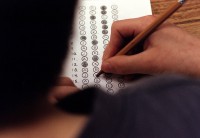
The standardized testing industry is a lucrative business. College Board, which writes and administers the Scholastic Aptitude Test (SAT) and other tests, reported in its 2012 forum that the overall revenue of these tests was just over $705 million. Despite the high costs of standardized tests, millions of students worldwide take them in hopes of winning scholarships and improving their chances of getting into their dream colleges. Because so many people take the SAT each year, it would make sense that the score a student receives on the SAT properly reflects the student’s education level.
Unfortunately, the SAT is a neither fair nor accurate test. Though it was initially made to be an IQ test, the SAT has now become an indicator of one’s wealth and knowledge of a limited set of reasoning skills. The SAT, which consists of Critical Reading, Writing and Math sections, does not accurately represent one’s proficiency in English and mathematics.
To be fair, the reading comprehension questions in the Critical Reading section do accurately represent one’s reading ability. However, the sentence completion vocabulary questions at the beginning of each Critical Reading section are not legitimate indicators of English proficiency. Because the SAT uses certain vocabulary words repeatedly, one can memorize a list of 2000 to 3000 key words and do very well on the sentence completion section. Rote memorization of words like “quotidian”, however, does not allow students to fully understand the words on a deeper level.
The Writing section, which includes multiple choice grammar questions and an essay, is even worse at measuring a student’s English proficiency. Massachussets Institute of Technology (MIT) Professor Les Perelman in his 2005 study found a 90% correlation between the length of an SAT essay and its score. What’s more, the SAT rewards students who can catch tiny grammatical errors in various sentences. A student’s knowledge of grammar rules is not indicative of his or her writing ability. Simply memorizing and practicing grammar questions cannot act as a substitute for years of writing essays and understanding the writing process.
The problem with the Math section is that the SAT does not test one’s actual knowledge of math, but instead tests one’s ability to work through problems quickly without making mistakes. A student could technically only know up to basic Algebra II and get an 800, a perfect score, while someone else in Calculus could get a 720 due to three silly mistakes. The SAT math questions are very good at tricking test takers. For example, one may assume that a variable ‘x’ includes zero, while the question briefly mentions that ‘x’ is positive. That student would inadvertently have an extra number in the number of possible values and get that question wrong. Test makers include words, such as inclusive, exclusive and nonnegative, that throw off students. Ultimately, the SAT is doing a disservice to students by not testing their math reasoning, but testing their ability to catch errors instead.
The abundance of prep books and “boot camps” only makes the problem worse. Assuming that students spend enough time, they can practically buy their scores by going to summer SAT programs, which cost thousands of dollars. These structured programs constantly give quizzes, practice questions, mock tests and test-taking strategies for improving scores. Therefore, those who attend these camps have the edge over those who do not. A College Board report on 2013 College-Bound Seniors indicates that there is a positive correlation between family income and SAT score. Students in families with an income of over $200,000 score a high average SAT score of 1714, while those with income less than $20,000 score a much lower average SAT score of 1326.
Of course, there are also many SAT “dictionaries” that improve Critical Reading scores by giving quick and dirty vocabulary lists. Other test prep companies sell books offering mock exams and strategies for “attacking” the SAT. Only the students with enough money can afford these resources and, hence, do better on the “aptitude” test.
Despite the obvious flaws in the SAT, there is no option right now but to take the test. Only colleges and universities have the power to force College Board to make fairer tests. For now, students are forced to continue this despondent SAT journey and take away time from more important schoolwork and extracurricular activities. Those who refuse to go on this path only put themselves at a disadvantage. Just remember that these tests do not test your intelligence. They only test your preparation skills.
Written by ANDREW HONGStaff Writer









